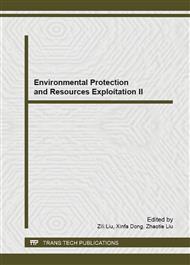[1]
Lin Boqiang, He Xiaoping. Chinese Oil and Gas Depletion Costs and Macroeconomic Impacts of Resource Tax [J]. Economic Research Journal, 2008, No. 5. (in Chinese).
Google Scholar
[2]
Wang Shuman, Qu Futian. Water resources accounting and adjustment of GDP – A case study of the developed areas in the eastern part of China [J], Journal of Nanjing Agricultural University, 2001, 24(2): 115~118. (in Chinese).
Google Scholar
[3]
Jiang Xia. Study on the natural resources depletion cost in green GDP accounting [J]. Market Weekly, 2007. (in Chinese).
Google Scholar
[4]
The Ministry of Water Resources of the People's Republic of China, China Water Resources Bulletin [M]. China Water Power Press, 2008. (in Chinese).
Google Scholar
[5]
Gao Minxue. Environment Statistics and Environmental-Economic Accounting [M]. China Statistics Press, 2000. (in Chinese).
Google Scholar
[6]
Gan Hong, Gao Minxue. Basis and thoughts on creating the System of Environmental-Economic Accounting for Water (SEEAW) of China [J], China Water. 2008, (17): 1-5. (in Chinese).
Google Scholar
[7]
European Commission. SERIEE European System for the Collection of Economic Information on the Environment-1994 Version [M]. Bruseels: Eurostat, (2002).
Google Scholar
[8]
UN: Integrated Environmental and Economic Accounting-2003 [M]. Final draft, (2003).
Google Scholar
[9]
Lei Ming. The Green Input-Output Accounting: theory and application [M]. Beijing University Press, 2000. (in Chinese).
Google Scholar
[10]
Yang Miankun. A preliminary research into the theory of green GDP accounting [J]. Statistical Research, 2001, No. 2. (in Chinese).
Google Scholar
[11]
Zhang Lijun, Li Mao, Liu Xinwei. Physical Quantity Accounting of Land Resources in China [J]. Land and Resources Information, 2006, No. 3. (in Chinese).
Google Scholar
[12]
Zhang Ying. Green accounting-a theoretical and empirical study on value accounting of forest resources and bringing of it in line with the national economic accounting system in china [M]. China Environmental Science Press, 2001. (in Chinese).
Google Scholar
[13]
Zhu Qigui. Drawing on a Comparison of Green National Accounting Systems [J]. Journal of Shanghai Jiao Tong University, 2006, Vol. 14, No. 5. (in Chinese).
Google Scholar
[14]
Hou Yuanzhao. Forest Environmental Value Accounting [M]. China Science and Technology Press, 2002. (in Chinese).
Google Scholar
[15]
Qin Yao, Lu Xin. The Research and Practice of the Green GDP Accounting based on Industrial Pollution in Chongqing [J]. Statistical Research, 2005. (in Chinese).
Google Scholar
[16]
Lei Ming, Hu Yichao. Compiling Regional Green Input-output Table-The Compilation and Analysis of Green Input-output Tables of Ningxia for the Year of 1997 [J]. Statistical Research, 2004. (in Chinese).
Google Scholar
[17]
Chen Dongjing. The theory and application of SEEA [M]. Yellow River Conservancy Press, 2005. (in Chinese).
Google Scholar
[18]
John M. Hartwick, Nancy D. Olewiler. The Economics of natural resources use [M]. Wesley Educational Publishers, the United States of America, (1998).
Google Scholar


